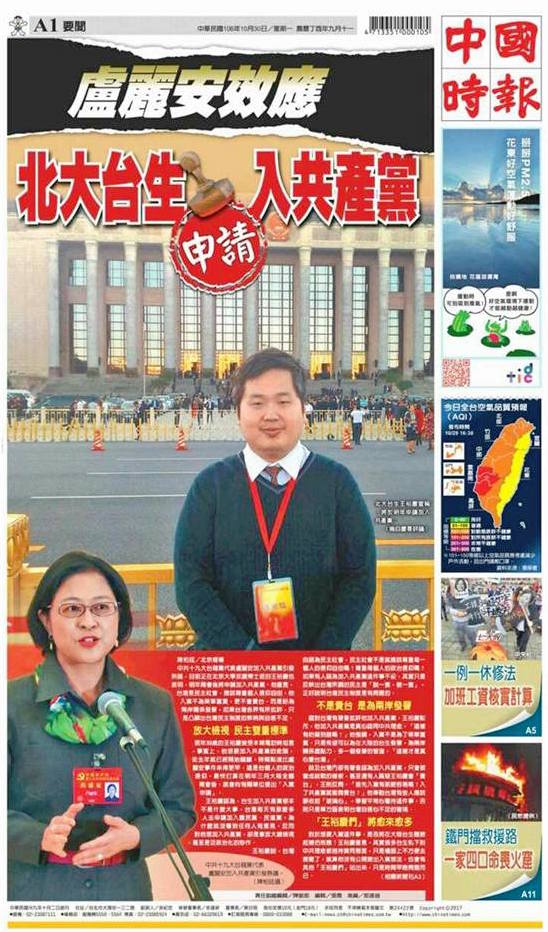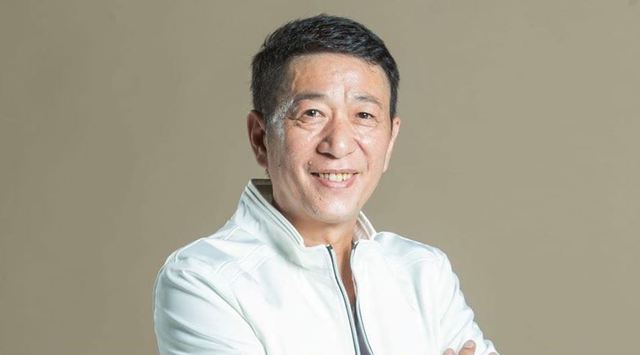A Taiwan-born pro-unification student who wants to join the Chinese Communist Party may have become the latest tool in Beijing’s united front work against Taiwan.
A Taiwanese PhD student currently enrolled at Peking University in Beijing says he wants to join the Chinese Communist Party (CCP) and is now slamming Taiwan’s democracy for threatening to fine him if he does.
Tom Wang, 39, stated his intention to seek membership in the CCP next year after the two sessions of the 19th CCP party congress, which concluded last week. After Wang, who holds a Master’s Degree from York University in Toronto, Canada, made his announcement — coincidentally first reported in the Beijing-friendly China Times — Taiwan’s Mainland Affairs Council (MAC) indicated that the student could be fined between NT$100,000 and NT$500,000 (US$3,315-US$16,575) for violating Article 33 Paragraph 2 of the Act Governing Relations between the People of the Taiwan Area and the Mainland Area.
According to CCP regulations, an applicant who desires to join the Party must, among other things, be a Chinese national.
No sooner had the MAC made its statement than Wang, who is believed to have Canadian citizenship (he now denies this) and is married to a Chinese national, went on the offensive, giving interviews to Chinese media in which he accused Taiwan’s democracy and the ruling Democratic Progressive Party (DPP) of having a “glass heart” and “lacking confidence.”
“Shame on Taiwan’s Democracy, Shame on DPP,” Wang says on his Facebook, the online platform to which, unlike most people in China, he appears to have full access. “The weakness of Taiwan’s democracy is exposed to the world,” he wrote in one of many posts on his page, which he has been updating on an hourly basis.
“I want to join the CPC not for fortune or a promising future. I intend to be responsible for my motherland,” the CCP mouthpiece Global Times reports him saying. “Taiwan’s so-called democracy and freedom would become empty words if the authorities implement such a regulation … They are just trying to threaten us students studying in the mainland to prevent us from joining the CCP.”
Wang, who openly supports unification and argues that socialism with Chinese characteristics is more advanced than systems in the West, said that as young Taiwanese gradually understand China better, more of them are bound to have an interest in joining the CCP.

Front page of the Beijing-friendly China Times on Oct. 30, 2017, highlighting the Tom Wang and Lu Li-an cases.
What’s at issue here isn’t Wang’s political beliefs or support for unification, views that Taiwan’s political system has countenanced over the years. After all, two parties committed to unification, the New Party and the China Unification Promotion Party (CUPP), are registered in Taiwan and can field candidates in local and national elections, as are a number of small communist parties. The problem with Wang is that he desires to join a foreign political party that is inimical to Taiwan and its democratic way of life, and that denies the very existence of Taiwan and/or the Republic of China (ROC), Taiwan’s official designation.
Wang’s announcement comes on the heels of a controversy over Lu Li-an, a China-based Taiwanese woman and president of the Shanghai Taiwan Compatriots Friendship Association who attended the 19th party congress earlier this month. The Kaohsiung-born Lu reportedly acquired People’s Republic of China (PRC) citizenship sometime before the party congress.
Tellingly, Wang’s gambit also dovetails with recent efforts by the CCP to woo Taiwanese students and young entrepreneurs as part of its redirected efforts to “win the hearts and minds” of the Taiwanese. Whether he is aware of this or not, Wang is now a tool of the CCP, part of a larger United Front effort by China to divide Taiwanese society and discredit its democratic system. One can well imagine that Chinese institutions, including universities, could now be pressuring Taiwanese students to join the CCP as a precondition for enrolment or employment.
It is not a sign of weakness if a democratic system implements measures to protect itself against a powerful, authoritarian, irredentist and increasingly repressive regime that seeks to impose its system on a small neighboring democracy. Nobody is denying Wang, or anyone, for that matter, the right to join the CCP, to sound like one if its propagandists, or even to become a citizen of the PRC, if such are their intentions. But one cannot have it both ways. Not in the current environment.
As he continues to lament his “persecution,” Wang should try to imagine what would happen if one of his Chinese friends at Peking University stated publicly that he or she intended to join the DPP in Taiwan.
This article was updated on 2017.10.31, 21:47: para. 4, Canadian citizenship.
You might also like
More from China
A Few Thoughts on the Meng-Spavor-Kovrig Exchange
It is hard not to see this weekend’s developments as a victory for China and the creation of a world …
As Coronavirus Crisis Intensifies, Beijing Continues to Play Politics Over Taiwan
With a major epidemic on its hands, the Chinese government has not ceased its political warfare activities against Taiwan. It …
Candidate Claims ‘Nobody Loves Taiwan More Than Xi Jinping’
Family business connections in the Pingtan free-trade zone and a son’s involvement with the CPPCC are raising questions about possible …









